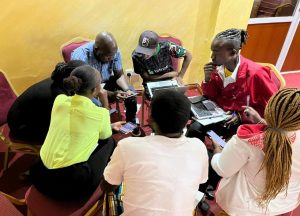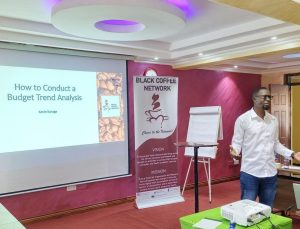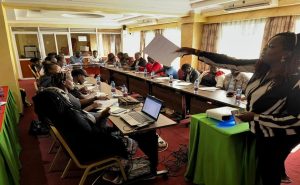Black Coffee Network’s Capacity Building for Budget Champions.
 07 May 2024
07 May 2024
Black Coffee Network has been at the forefront of budget advocacy and social accountability in Nakuru County, by taking part in the budget-making process through submission of memoranda, attending public participation forums, and stakeholder engagement with key decision-makers on budget. The key objective is to ensure an intersectional lens is employed during budget allocation and gender-responsive-budgeting is prioritized.
To ensure that young people have a sense of ownership of the budget advocacy initiatives. BCN established a team of 15 young people who it recognizes as budget champions. These are TOTs who spearhead budget advocacy in BCN after going through a continuous capacity-building process to deepen their understanding of budget issues and sharpen their skills in budget advocacy.
The backbone of conducting budget advocacy is to analyze and understand County budget documents, hence, between 15th February and 11th March 2024, BCN conducted ten sessions on budget document analysis with the budget champions. The analysis focused on resource mobilization of the county revenue, budget appropriation, budget allocation, and budget expenditure. The activity aimed to critically analyze Nakuru County’s budget documents, examine the priorities of RMNCAH programs in the county budget documents, align with the national government policies on health, and track budget trends on RMNCAH.
Out of all budget documents, 10 which were the most critical were selected including; The County Integrated Development Plan (CIDP), The Annual Development Plan (ADP), Medium Term Expenditure Framework (MTEF), The County Fiscal Strategy Paper (CFSP), The County Budget Review and Outlook Paper (CBROP, The Nakuru County Finance Bill, 2023, Appropriation bill, Auditor’s General Report, Controller of Budget report to monitor budget execution and implementation and Program-based-budget.

The budget champions analyzing the county budget documents during the session.
Challenges identified.
During the 2022/2023 financial year, 40% of the total budget was allocated to health. It was evident that health got the lion’s share of the budget yet despite this allocation, the health department was the most burdened by public debt. The lack of a clear implementation framework remains the biggest challenge when it comes to budget implementation and budget tracking.
In addition, it emerged that there was a delay in fund disbursement which further impacted program implementation. Inadequate human resource-that is insufficient staff to provide services in existing and new healthcare facilities, lack of funds for recruitment-which is the limited allocation for promoting and recruiting healthcare workers and low uptake of services (some services like RMNCAH had low utilization rates) were some of the other challenges that were highlighted.
Moreover, there were challenges in accessing quality mental health services, an existing non-alignment with National Health Policies (priorities in the budget did not align with the commitments on the national health policies), the delayed County Integrated Development Plan CIDP launch that was made publicly available on launch day after a two-year delay and finally, -a constant challenge through the years-the high allocation of recurrent expenditure as most allocations were directed towards recurrent expenses.
Addressing these challenges is crucial for effective resource allocation, service delivery improvement, and policy coherence within Nakuru county’s healthcare system.

Facilitator Kevin Karuga, conducting a session on how to conduct budget trend analysis.
Emerging Budget Trends
According to the Mid-Term Expenditure Framework document, several emerging issues impacted the budget process in Nakuru County.
- Climate change impact– Nakuru county was facing challenges due to climate change and extreme weather conditions, leading to increased costs associated with natural disasters and climate-driven risks like floods and droughts. This poses financial burdens on counties, requiring them to allocate funds for reconstruction and disaster response.
- Health coverage transition resistance– the transition from National Health Insurance Fund (NHIF) to State Health Insurance Fund (SHIF) for universal health coverage was met with resistance due to factors like ignorance and political influences. This resistance impacted the budgeting and implementation of healthcare programs.
- Reduced donor support– Nakuru County experienced a reduction in budgetary support from donors and partners. This decrease in external funding sources strained county budgets and affected the delivery of essential services and programs.
- Political interference– Nakuru county faced significant political interference from politicians in budgetary matters. Political involvement in budget decisions leads to inefficiencies, misallocation of resources, and challenges in implementing effective fiscal policies.
These trends highlight the complex landscape of budgeting in Nakuru County, where environmental factors, healthcare transitions, donor support fluctuations, and political influences play crucial roles in shaping budget priorities and financial sustainability. Addressing these emerging trends requires strategic planning, stakeholder engagement, and effective governance to ensure fiscal resilience and efficient resource allocation.
Recommendations
After the analysis of the budget documents, the following call to action was developed for the County government and other stakeholders at large.
Use of intersectional approach in Health Act implementation, implementing the primary Health Act using an intersectionality lens is recommended to address challenges related to mental health, reproductive health, and accessibility within the healthcare system. This approach ensures a comprehensive response to health issues.
Civil society organizations support youth-led advocacy, the civil society organizations should support youth-led advocacy processes to ensure meaningful youth participation in planning, budgeting, and accountability processes. This support was crucial for empowering young people to engage effectively in decision-making and governance, especially in areas related to planning and budget allocation.
Timely availability of budget documents, that is ensuring that budget documents are made available to the public promptly, which enhances transparency and public participation in the budgeting process. This transparency allows for better understanding and scrutiny of budget allocations.
Timely disbursement of funds, that is ensuring timely disbursement of funds from the national government to the county is essential for smooth implementation of programs and services as per the allocated budgets. Timely disbursement prevents disruptions in service delivery due to financial constraints.
Utilization of networks for information, that is leveraging available networks to access unavailable budget documents and obtain accurate information on budget processes was crucial for informed decision-making and understanding the intricacies of budget planning and implementation.
Partnerships for budget advocacy, and collaborating with duty bearers, like-minded organizations, and community members are essential for effective budget advocacy. Such partnerships can amplify advocacy efforts and ensure that budget objectives are met through collective action.
Awareness creation, creating awareness about “The Mwananchi Guide” was important as it educates and inform the public about budget-related matters, empowering them to engage more effectively in budget processes.
Strengthening the technical working groups and enhancing the existing reproductive health technical working groups was vital for improving coordination and effectiveness in addressing reproductive health challenges within the county. This strengthening can lead to better outcomes in reproductive health services.
Fast-tracking fund absorption and expediting the absorption of funds was necessary to ensure efficient utilization of budget allocations for various programs and services. This fast-tracking can prevent delays in implementing crucial projects and services.
Sensitization of service providers, capacity building of service providers on youth-friendly services, and investment in human resources will enhance service delivery, especially in reproductive, maternal, newborn, child, and adolescent health (RMNCAH). This sensitization improves the quality of services provided to these vulnerable groups.
The government should invest in demand creation, investing in demand creation activities like comprehensive sexuality education and community awareness was crucial to promote access to RMNCAH services, particularly targeting young women and adolescents. This investment can lead to increased utilization of essential health services by these groups.
Evidence-based decision-making, that is emphasizing evidence-based decision-making in budget allocation was essential for ensuring that financial resources are allocated efficiently and effectively. By basing budget decisions on solid evidence and data, governments and organizations can optimize resource utilization and achieve better outcomes in service delivery and program implementation.

Angela Kioko, Black Coffee Network, Program manager facilitating the action planning session.



